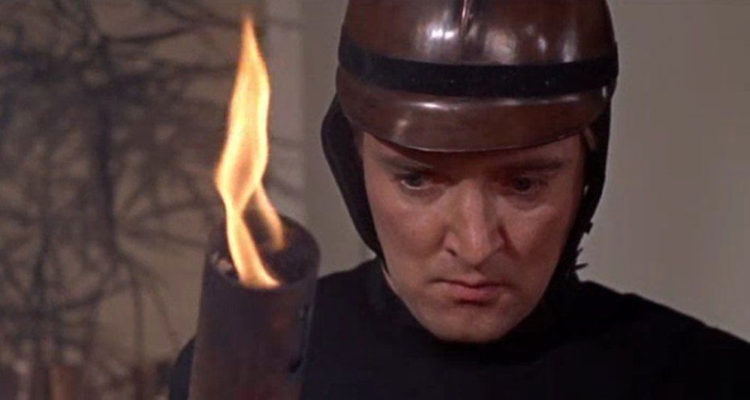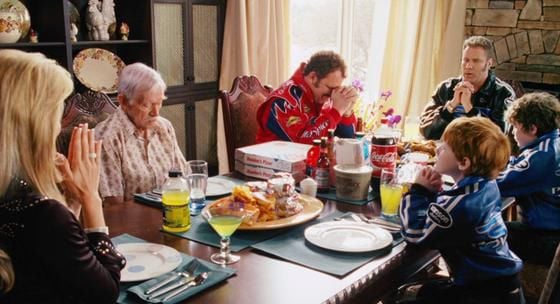Winston and Julia had been having a private rebellion, hiding among the Proles for rendezvous. Winston had the notion that O’Brien was a follower of Goldstein. The elusive Goldstein, oft heard of but no one could really quantify what he thought. Like Snowball in Animal Farm, he was the one scapegoated for all that went wrong.
And so the couple decide to visit O’Brien in his home and confess that they’d willing do, and suffer, anything for the cause. O’Brien would covertly provide “the Book” to Winston which explained Goldstein’s views.
And so there our heroic couple is, in their love nest above Mr. Charrington’s shop, as Winston begins to read The Theory and Practice of Oligarchical Collectivism by Emmanuel Goldstein. Or so it claimed.
The basic premise is that no matter what the political system there are always three groups of people: the High, the Middle, and the Low. Who is High depends on the system: nobles in a monarchy, the party elite in socialism, communism and other forms of totalitarian governments, and the wealthy elite in capitalism. It is either about bloodlines, ideology or wealth. Whatever “it” is, if you don’t have “it” you are on the outside looking in. Revolutions have replace one High group with another.
“The aim of the High is to remain where they are. The aim of the Middle is to change places with the High. The aim of the Low, when they have an aim- for it is an abiding characteristic of the Low that they are too much crushed by drudgery to be more than intermittently conscious of anything outside their daily lives- is to abolish all distinctions and create a society in which all men shall be equal.”
War has changed from trying to rule the world to unending wars with limited aims between nations unable or unwilling to annihilate the other. War has a purpose for the High to keep the Middle and Low needing the High to keep them safe. War is also for the labor power needed by the three superstates for their now self-contained economies.
“The primary aim of modern warfare (in accordance with the principles of doublethink, this aim is simultaneously recognized and not recognized by the directing brains of the Inner Party)is to use up the products of the machine without raising the general standard of living.”
The hierarchical society is only maintained by the presence of poverty and ignorance. The elites work to keep people poor and ignorant while simultaneously claiming to work to eliminate poverty and ignorance. (Is any of this sounding familiar??) War uses resources that would otherwise be used to actually improve the lives of the Middle and the Low. Yet, in keeping with doublethink, the Inner Party believes they will actually win.
“It is to be achieved by some new and unanswerable weapon. The search for new weapons continues unceasingly, and is one of the few remaining activities in wich the inventive or speculative type of mind can find any outlet. In Oceania at the present day, Science, in the old sense, has almost ceased to exist. In Newspeak there is no word for “Science.” The empirical method of thought, on which all the scientific achievements of the past were founded, is opposed to the most fundamental principles of Ingsoc. … The two aims of the Party are to conquer the whole surface of the earth and to extinguish once and for all the possibility of independent thought.”
Science and engineering are largely dominated by the military-industrial complex, not the quest for bettering life. While there doesn’t seem to be an internet, the media keeps the people ignorant by “re-writing” history to suit present needs. Information is controlled by the Party to achieve their ends (sound familiar?).
What people didn’t realize is that the three superstates had the same basic ideology though they went by different names. In Oceania it was Ingsoc, Eurasia it was called Neo-Bolshevism and in East Asia it was a word translated “Death Worship”. Keep in mind Orwell is writing this after World War II, and is seeing the world through the superpowers of the Allies (England, the US, France and allied nations), the USSR and its growing number of subservient nations, and China who would eventually dominate much of Asia to spread Maoism (through a series of wars fought with the Allies) while the Allies and Russia fought an unending Cold War.
The wars ceased to be dangerous though unending. They were for relatively small disputed territories for labor aka slaves. Nothing in Oceania was considered to be efficient except for the Thought Police. The real war is to keep each superstate intact by making war on one’s own citizens.
Property is increasingly owned by fewer and fewer people. Then private property was abolished so that the Party owned everything collectively. The Party also doles out property to the “faithful” thereby institutionalizing inequality instead of making it the result of opportunities seized and squandered (with the element of “chance” tossed in since a drought or storm can destroy your crops or factory).
Big Brother, the haunting figure throughout the book, is not really a person. He is the Party which watches everyone. No one has ever seen Big Brother as a result, though they might imagine they have. He is the guise by which the Party presents itself to the world.

Party membership is not hereditary. There is the Inner Party (about 2% of the population) and the Outer Party (aka the Middle) and then the Proles or the Low. Admission to the Party, either Inner or Outer, is by examination. The Thought Police oversee the Party members. Their surveillance is seemingly ceaseless. They can see you doing most anything including in the bath, but you aren’t sure if they actually are at any given moment.
There is no express law for you to know whether you are guilty or a criminal or not. Whether you are guilty is in the eyes of the Thought Police. The purges and late night arrests are for those who may at some point threaten the Inner Party. Since there is no stable view of the past for comparison, people tolerate the current state of affairs no matter what they may be.
As the past is changed, it is necessary to adjust all written records of the past so agree with the present orthodoxy (like who is a hero or villain and with which Superstate you are allied with and fighting against- again, similar to what happens in Animal Farm). “Doublethink means the power of holding two contradictory beliefs in one’s mind simultaneously, and accepting them both.” The Party members know they are playing tricks with reality. This lies at the heart of Ingsoc as the Party uses conscious deception while acting as though honest. As a result, the Party reviles the practices of the Socialist Movement in the name of Socialism.
Julia has fallen asleep. Winston stops reading the book. In terms of doublethink, Goldstein is likely as made up as Big Brother. The Brotherhood or Resistance is not real but this book likely reveals how the Inner Party functions. It is, as one friend said about 12 Monkeys, a mind screw. The Party unmasks itself through the guise of Goldstein.

And so Winston Smith falls asleep reminding himself that “sanity isn’t statistical”. It isn’t based on the number of people who believe what you believe. Sanity is about coherence with reality, not the ever-revised reality of the Party. The Party makes you think you are insane because they keep changing reality. Thanks to doublethink you both know and don’t know it. The truth is lost in the twist and turns of circumstances. It is collective gaslighting. “I wouldn’t trust a vaccine from Trump” becomes “You must have the vaccine because I’m president now and you should trust me.” “You don’t need a mask” becomes “You might need two.” In this ever-changing reality those who remember both statements feel crazy and are called crazy. Those who replace one thought with the other think they are sane in their ignorance.
When he awakes, his whole life changes.










